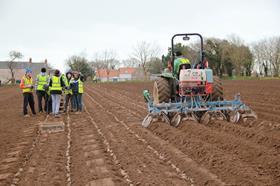
Around a third of workers in some areas of Britain are set for a payrise when the new National Living Wage (NLW) comes into effect this Friday (1 April), new figures have shown.
Research from think tank Resolution Foundation found that the NLW, which is set for £7.20 an hour for employees aged 25 and over, will have more impact in some areas of the UK.
It also said that the proportion of workers affected will increase as the NLW is increased up towards its target rate of 60 per cent of typical earnings in 2020, when it is projected to be around £9 an hour.
The news comes following figures that suggested the NLW will mean a 10.8 per cent pay rise for those who have been on the minimum wage over the last year.
Torridge in Devon will see the highest wage increase, with over one in three workers set for a payrise, followed by Rossendale in Lancashire, Woking in Surrey and Castle Point in Essex, and areas in Suffolk, Derbyshire, Norfolk and Kent.
In contrast the NLW will have far less impact in London and parts of the south east, the Foundation said.
While workers will benefit from higher wages, the thinktank also noted that local employers will come under increased pressure and are likely to see “significant wage bill increases”.
It said that ensuring the NLW is successful for both workers and employers should be a top priority for government, and for councils in areas where labour markets are heavily affected.
“The National Living Wage is a hugely ambitious policy with the potential to transform Britain’s low pay landscape,” said director of the Resolution Foundation, said Torsten Bell.
“Britain’s new legal wage floor will be felt throughout the country, but its impact will be bigger in some areas than others.
“Of course pay rises don’t come free so employers in some sectors and parts of the country will feel the pressure more than others. That’s why it’s vital that businesses and national, regional and local government make the successful implementation of the new legal minimum a priority.”
The farming industry has repeated expressed concern about the introduction of the NLW and the impact on an already-squeezed supply chain.
NFU Scotland estimated that for some businesses, particularly soft fruit and vegetables, wages can represent more than 40 percent of the operating costs.
NFU Scotland chief executive Scott Walker said: “NFUS fully supports the principle of a living wage for all workers in the agricultural industry and we are clear in our ambition that this industry is seen as one that offers good employment opportunities and exciting and rewarding careers.
“Farmers and growers know that to attract skilled and dedicated workers – whether permanent or seasonal – they need to pay a wage that is competitive. As a result, most full time workers in farming are already paid well in excess of the living wage.
“The supply chain needs to recognise that what they pay for farm produce is the biggest determinant of what a business can afford to pay its staff and any sensible sourcing commitment from retailers needs to address this issue.”



